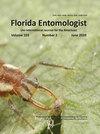Survey of the Ficus Whitefly, Singhiella simplex (Hemiptera: Aleyrodidae), and Its Natural Enemies in the Western Mediterranean Region of Turkey
IF 1.2
4区 农林科学
Q3 ENTOMOLOGY
引用次数: 0
Abstract
Abstract In this study, the distribution of the Ficus whitefly, Singhiella simplex (Singh) (Hemiptera: Aleyrodidae), and its natural enemies in the Western Mediterranean Region of Turkey were investigated. For this purpose, the sampling was made from trees of Ficus spp. during Aug, Sep, and Oct when the pest population was at its peak in the various districts within the Antalya province in 2018 and 2019. In addition, the rate of natural parasitism in the sampling periods also was determined. To determine the dispersal and parasitoids of S. simplex, at least 100 branches were collected from Ficus trees in each district, the Ficus trees were checked visually for the determination of the predators. The results showed that Ficus whitefly is dispersed in all the districts within the Antalya province. Encarsia protransvena Viggiani (Hymenoptera: Aphelinidae) has been identified as the parasitoid of the Ficus whitefly in Antalya and its districts, wereas the highest natural parasitism rate was found to be 32.88% and 21.66% in Oct 2018 and 2019, respectively, across the sampling mo. Chrysoperla mutata (McLachlan) (Neuroptera: Chrysopidae), Semidalis aleyrodiformis (Stephens) (Neuroptera: Coniopterygidae), Conwentzia psociformis (Curtis) (Neuroptera: Coniopterygidae), Conwentzia sp. (Neuroptera: Coniopterygidae), Oenopia conglobata (L.) (Coleoptera: Coccinellidae), and Serangium parcesetosum Sicard (Coleoptera: Coccinellidae) species were determined as the predators. The results obtained in the study may contribute to the control of S. simplex by using its natural enemies. Resumen En este estudio, se investigó la distribución de la mosca blanca del ficus, Singhiella simplex (Singh) (Hemiptera: Aleyrodidae), y sus enemigos naturales en la región mediterránea occidental de Turquía. Para tal efecto, el muestreo se realizó a partir de árboles de Ficus spp. durante agosto, septiembre y octubre, cuando la población de plagas alcanzó su punto máximo en los diversos distritos de la provincia de Antalya en el 2018 y 2019. Además, también se determinó la tasa de parasitismo natural en los períodos de muestreo. Para determinar la dispersión y parasitoides de S. simplex se recolectaron al menos 100 ramas de árboles de Ficus en cada distrito, los árboles de Ficus fueron revisados visualmente para la determinación de los depredadores. Los resultados mostraron que la mosca blanca del ficus está dispersa en todos los distritos dentro de la provincia de Antalya. Encarsia protransvena Viggiani (Hymenoptera: Aphelinidae) ha sido identificada como el parasitoide de la mosca blanca del ficus en Antalya y sus distritos, donde se encontró que la tasa de parasitismo natural más alta del 32,88% y el 21,66% en octubre de 2018 y 2019, respectivamente. Se determinó Chrysoperla mutata (McLachlan) (Neuroptera: Chrysopidae), Semidalis aleyrodiformis (Stephens) (Neuroptera: Coniopterygidae), Conwentzia psociformis (Curtis) (Neuroptera: Coniopterygidae), Conwentzia sp., Oenopia conglobata (L.) (Coleoptera: Coccinellidae), y Serangium parcesetosum Sicard (Coleoptera: Coccinellidae) como depredadores. Los resultados obtenidos en el estudio pueden contribuir al control de S. simplex mediante el uso de sus enemigos naturales.土耳其西地中海地区Ficus Whitefly,Singhiella simplex(半翅目:Aleyrodidae)及其天敌调查
摘要本文调查了土耳其西地中海地区白蝇、单纯单翅星蝇(Singhiella simplex, Singh)及其天敌的分布。为此,在2018年和2019年安塔利亚省各区害虫种群高峰期的8月、9月和10月对榕树进行采样。此外,还测定了采样期内的自然寄生率。为确定单纯螺旋体线虫的分布和寄生性,在各区收集了至少100根榕枝,目测了这些榕枝上的天敌。结果表明,白蝇在安塔利亚省各地区均有分布。2018年10月和2019年10月,安塔利亚及其地区的榕白蝇的自然寄生率分别为32.88%和21.66%,经鉴定为原transvena Viggiani(膜翅目:蚜蝇科),其中变形蝶蛹(McLachlan)(神经翅目:蚜蝇科),异蚜半蛹(Stephens)(神经翅目:蚜蝇科),psociformconwia (Curtis)(神经翅目:蚜蝇科)。确定蠓科(Coniopterygidae)、conentzia sp.(神经翅目:蠓科)、conenopia conglobata(鞘翅目:瓢虫科)和parcesetosum Sicard(鞘翅目:瓢虫科)为捕食者。研究结果可为利用单纯葡萄球菌的天敌防治单纯葡萄球菌提供参考。resume En este estustudio, se investigó la distribución de la mosca blanca del ficus, Singhiella simplex (Singh)(半翅目:Aleyrodidae), y sus enemigos naturales En la región mediterránea occidental de Turquía。Para - effects, el muestreo se realizó a partite de árboles de Ficus spp. durante agosto, 9月至10月,cuando la población de plagas alcanzó su punto máximo en los diversos distrios de la province de Antalya en el 2018 - 2019。Además, tamamacimn se determinó la tasa de parasitissmo natural en los períodos de muestreo。Para determinar la dispersión y parasitoides de S. simplex se recrecon all menos 100 ramas de árboles de Ficus en cadada distrito, los árboles de Ficus fueron revisados visualmente Para la determinación de los depredadores。安塔利亚省的“结果”是:在安塔利亚省的“结果”是:在安塔利亚省的“结果”是:在安塔利亚省的“结果”是:在安塔利亚省的“结果”是:在安塔利亚省。2018年10月至2019年10月,安塔利亚白斑蛱蝶(膜翅目:蛱蝶科)在安塔利亚的分布中鉴定出了寄生在白色蛱蝶上的寄生蜂,分别鉴定出了寄生在白色蛱蝶上的寄生蜂encontró、寄生在白色蛱蝶上的寄生蜂más、寄生在白色蛱蝶上的寄生蜂分别为32%、88%、66%。见determinó突变金蝶(McLachlan)(神经翅目:金蝶科)、异翅半金蝶(Stephens)(神经翅目:金蝶科)、金翅半金蝶(Curtis)(神经翅目:金蝶科)、金蝶属、大金蝶(L.)(鞘翅目:金蝶科)、金翅小金蝶(L.)(鞘翅目:金蝶科)结果表明,单纯性单纯性单纯性单纯性单纯性单纯性单纯性单纯性单纯性单纯性单纯性单纯性单纯性单纯性单纯性单纯性单纯性单纯性单纯性单纯性。
本文章由计算机程序翻译,如有差异,请以英文原文为准。
求助全文
约1分钟内获得全文
求助全文
来源期刊

Florida Entomologist
生物-昆虫学
CiteScore
2.10
自引率
7.10%
发文量
44
审稿时长
3 months
期刊介绍:
Florida Entomologist is the official journal of the Florida Entomological Society. Volumes 1-3 were published under the name The Florida Buggist. The Florida Entomological Society still produces the traditionally printed version of Florida Entomologist, but you can also view, search, or print any article published since June 1917 by accessing online files. Web access is made possible by the Society’s electronic publication project begun in 1993
 求助内容:
求助内容: 应助结果提醒方式:
应助结果提醒方式:


